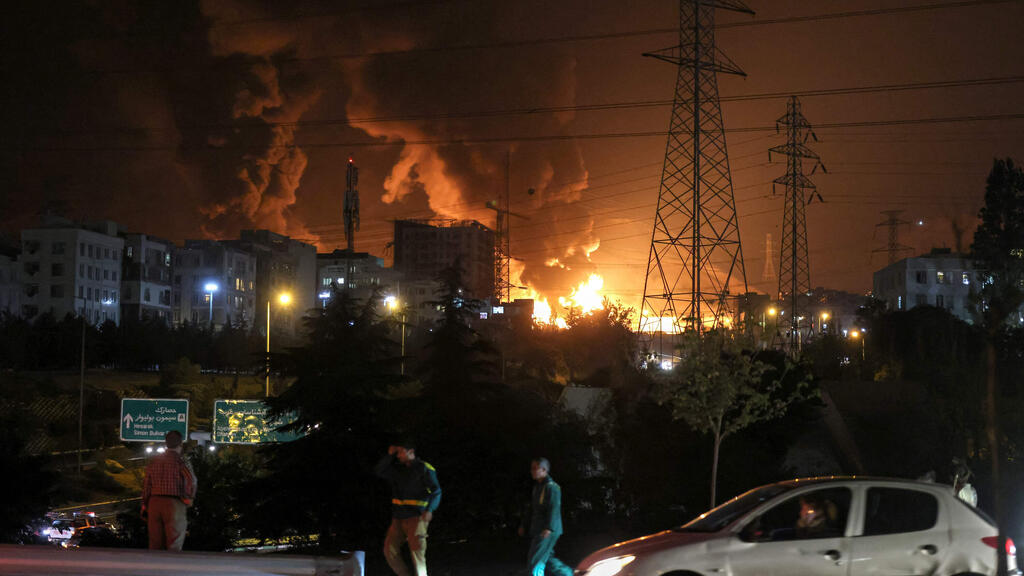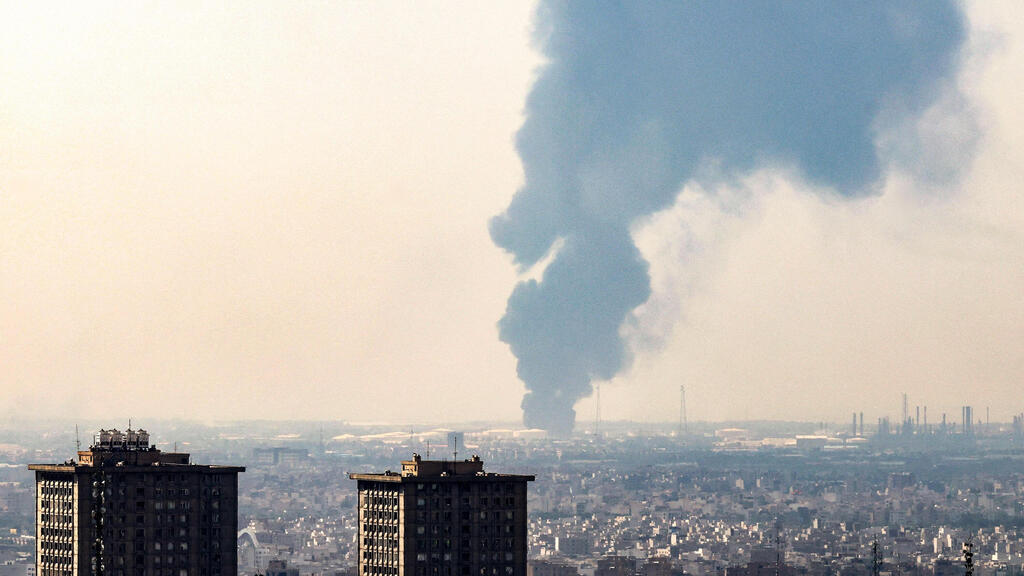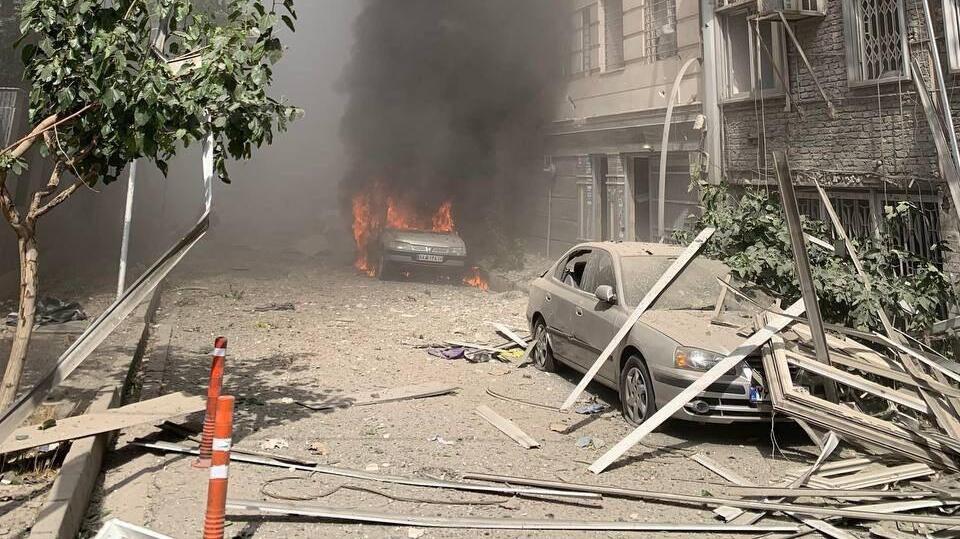Following overnight Israeli airstrikes on dozens of targets in Tehran, the Israeli Air Force resumed operations across Iran on Sunday morning. Explosions were reported in cities across the country, including Shiraz in the south, Kermanshah in the west and Isfahan in central Iran.
Iranian Foreign Minister Abbas Araghchi condemned what he called “Zionist aggression” against Iran and claimed that the missile barrages on Israel’s central and northern regions were “acts of self-defense under international law.”
Araghchi said that Iran’s response “will continue” and that Tehran’s goal is to defend itself against what he described as “brutal aggression.” According to him, Iran initially struck Israeli military sites and later targeted an oil refinery in Haifa. Iran’s military announced it would keep delivering “severe blows” to Israel and said its forces remain on full alert. Iran’s new army chief, Amir Hatami, declared, “We will defend our independence, territorial integrity and system to our last breath.”
Araghchi also addressed nuclear negotiations with the U.S., accusing Israel of seeking to derail diplomacy. “We held five rounds of indirect talks and were due to present our proposal in the sixth. We are not willing to sign any agreement that forces us to give up our nuclear rights. In 2021, during talks to revive the nuclear deal, Israel sabotaged Natanz. What it has done again now, in coordination with the U.S., is meant to disrupt the negotiations.”
The IDF confirmed that Israeli airstrikes continued overnight across Iran, targeting and destroying armed surface-to-surface missile launchers that were ready to fire. Launchers that had already fired on Israel were also hit in rapid follow-up strikes. Additional targets included air defense infrastructure and radar systems, part of Israel’s efforts to maintain air superiority over Iran.
Reports from inside Iran confirmed new explosions in Kermanshah and Isfahan. A deputy security official in Isfahan province said that a facility linked to the Defense Ministry had been hit. Pro-Iranian militia-linked Iraqi outlet Sabereen News reported strikes on an electronics plant in Shiraz and a separate strike in Shahroud, in northern Iran. ISNA, a semi-official Iranian news agency, confirmed that the Defense Ministry’s headquarters in Isfahan was damaged.
Later in the day, another barrage of Iranian missiles triggered air raid sirens across Israel. The country's air defense systems responded successfully, and no casualties were reported. Shortly afterward, Iranian media reported that “Israel detonated car bombs in Tehran.” According to two Gulf-based sources cited by Reuters, at least 14 Iranian nuclear scientists were killed in Israeli strikes, some via car bombs. Iranian state news agency IRNA claimed five explosive devices were detonated in different parts of Tehran.
Saturday night saw the largest Israeli airstrike on Tehran since the start of the operation. Dozens of fighter jets hit targets across the capital within an hour, including a central fuel depot and weapons stockpiles. Iranian personnel were reportedly among the targets, and several are believed to have been eliminated. Iran’s Ministry of Petroleum confirmed that two fuel facilities in Tehran were hit by the IDF. Iran’s health minister claimed that most of the casualties were women and children.
IDF issues rare civilian warning in Persian
In a rare move, IDF Arabic-language spokesperson Avichay Adraee issued a direct evacuation warning to Iranian civilians. In a post on X, he urged anyone near or working in ballistic missile production facilities to evacuate immediately. “For your safety, leave these areas now and do not return until further notice. Being near them endangers your life,” he wrote.
Defense Minister Israel Katz confirmed the warning was issued under his directive, saying the IDF “will continue peeling away the Iranian snake’s skin—its nuclear and weapons capabilities—both in Tehran and elsewhere.” He added, “The Iranian dictator is turning Tehran into Beirut and its citizens into hostages to preserve his regime.”
The IDF’s X account echoed that message: “While Iran attacks without warning, we choose to warn innocent civilians—even at the cost of losing the element of surprise. We issue these warnings in Persian on multiple platforms, because human life comes first. That is the difference between us and our enemies.”
A security official said Katz’s directive is part of a pre-approved plan to pressure the regime by prompting civilian evacuations in response to Iranian attacks on Israeli cities.
Iranian authorities reported the arrest of two alleged Mossad agents in Karaj, in northern Alborz Province. According to the semi-official Tasnim News Agency, the suspects were found with bombs, explosives, booby traps, and electronic devices. Footage allegedly from their home was shared by Iranian media.
Footage from Tehran
Meanwhile, Iranians are bracing for severe weather in the coming days, with rain, thunderstorms and high winds expected through Wednesday in the Caspian coastal province of Ardabil and the Azerbaijani provinces in the northwest. Tehran’s market was closed, and city council member Mehdi Chamran pointed to the shortage of bomb shelters across the capital and other cities. He urged residents to use whatever is available, especially subway tunnels, which are deep underground.
Government spokesperson Fatemeh Mohajerani later told citizens they could also take shelter in mosques, schools and the subway system. She assured the public that there were no shortages of food, medicine or fuel, but warned against answering unknown international phone numbers.
Get the Ynetnews app on your smartphone: Google Play: https://bit.ly/4eJ37pE | Apple App Store: https://bit.ly/3ZL7iNv
Amid the chaos, Tehran’s city council approved renaming a street after Hezbollah leader Hassan Nasrallah, who was killed last year in the fighting -war between Israel and the Lebanese terror group. The street currently bears the name of Khalid Islambouli, who assassinated Egyptian President Anwar Sadat. A prior plan to rename it “Palestinian Intifada Street” was approved but never implemented.
Despite a government ban on flights, footage published by opposition outlet Iran International, based in London, showed that planes were still departing from Mehrabad Airport. One video, submitted by an Iranian citizen, included the question: “If flights are banned, who is on these planes and where are they going?”
Flight-tracking site FlightRadar also showed commercial aircraft taking off from Tehran airports even as Iran’s Airports Authority had officially suspended all air traffic nationwide. Iranian media later claimed the aircraft were being relocated to “safe zones, beyond Israel’s reach.”
On Friday, Iran had already halted all flights at Tehran’s Imam Khomeini and Mehrabad airports due to the conflict with Israel. A separate video from Iran International appeared to show damage at Mehrabad Airport, reportedly from an Israeli strike. While Iranian outlets loyal to the regime later released footage to show the runway was still operational, other reports confirmed parts of the airport had sustained damage.







